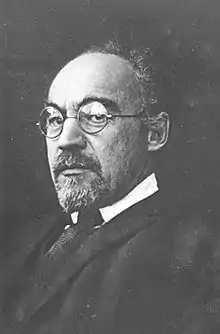Boris Brutskus | |
|---|---|
 | |
| Born | Palanga (Russian Empire) |
| Died | 7 December 1938 |
| Alma mater |
|
| Occupation | Economist, statistician, agriculturist |
Boris (Ber) Davydovich Brutskus (Russian: Борис (Бер) Давыдович Бруцкус, Hebrew: בוריס (בר/דּוֹב) בֶּן־דָּוִד ברוצקוס, German: Boris Brutzkus; October 15/October 3 (Russian information), 1874 – December 6/December 7 (same with birthdate), 1938) was an economist from the Russian Empire.
Brutskus was born in Polangen/Palanga in Lithuania, which was then part of the Russian Empire. His brother was the historian and politician Julius Brutzkus.
Brutskus published an English translation for Economic Planning in Soviet Russia with an introduction by Friedrich Hayek in 1935.[1]
He was forced into exile by the Bolshevik government in 1922.[2]
He died in 1938 in Jerusalem.
Literary works
- Экономия сельского хозяйства, народно-хозяйственные основа, 1924
- Die Lehre des Marxismus im Lichte der russischen Revolution, 1928
- B. D. Bruckus: »Ėkonomičeskija osnovy sovremennago političeskago krizisa Rossii« [i. e. Die ökonomischen Ursachen der gegenwärtigen politischen Krise Rußlands]. Russkij naučnyj institut RNI, Berlin, January 27, 1928 (i.e. Russian scientific institute)
References
- ↑ Brutzkus, Boris (1935). Economic Planning in Soviet Russia. Translated by Gardiner, Gilbert. London: George Routledge & Sons – via Internet Archive.
- ↑ Boris Brutskus Biography
External links
- Peoples.ru: Биография Борис Бруцкус / Boris Brutskus at www.peoples.ru (Russian)
- vgd.ru (Russian, short)
- Čajanov, Kerblay et les shestidesiatniki : une histoire globale ? at monderusse.revues.org (French)
- Iwan Iljin >> Personenverzeichnis Archived 2016-03-03 at the Wayback Machine at iljinru.tsygankov.ru (German)
- Works by or about Boris Brutskus at Internet Archive
This article is issued from Wikipedia. The text is licensed under Creative Commons - Attribution - Sharealike. Additional terms may apply for the media files.